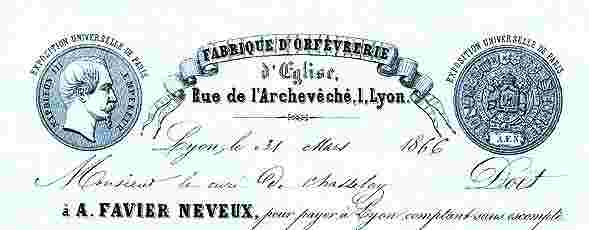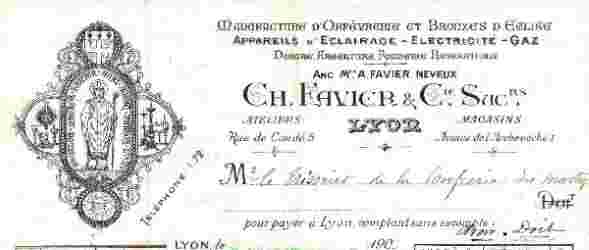(click on photos to enlarge image)
 Français
Français
FAVIER FAMILY
THREE TOWNS AND 150 YEARS OF SILVERSMITHING
The name Favier has a long and charged history, starting
approximately 1824 and ending in 1976. The Favier silversmiths
were famous manufacturers of ecclesiastical silver works such as
chalices, ciboria, monstrances, patens, cruets and plates. Their
work can be seen in many cathedral treasuries. At least 179
works are inventoried and protected today in the name of
historical monuments in the Ariège department.
Religious silversmithing was profoundly innovated by the Favier
family by excerpting on medieval sources and later by joining
movements of symbolism and Art Nouveau.
All four brothers were born at Meximieux, a municipality, 37 km
north-east of Lyon, Ain department, region Rhône-Alpes:
Jean-Marie-François-Henri Favier (also named François) on 28
July 1800, André-Michel Favier on 29 September 1805,
Pierre-Henry Favier on 11 July 1809 and Joseph Favier on 8
August 1811.
The Maison Favier in Lyon was established between 1824 and 1827
by two brothers François and André-Michel. Pierre-Henry, André
and Joseph Favier (François died in 1827 in Lyon) were very
close and worked together in Lyon from 1824 until Pierre-Henry
moved to Paris in 1846, followed a few years later by Joseph (before
1851).
François had three sons, Philippe (gilder, b.1821-d.1864),
Claude (silversmith, b.1824-d.1849) and Jean-Baptiste (silversmith,
b.1824-d.1899). André-Michel and his nephews Claude and
Jean-Baptiste managed the business Favier Frères in Lyon until
1860.
From 1860 until 1903 the name of the business became A.
Favier Neveux. In 1903 Charles-Marie Favier (son of
Jean-Baptiste) established the company Favier Charles & Cie and
the activity of the company lasted until 1972. From 1941 on,
Georges Favier, son of Charles Favier, managed the company.
Finally, in 1972 the company became Manufacture d'Orfèvrerie et
Bronzes d'Eglise, which ended its activity in 1976.
In 1848 Pierre-Henry took over the workshop of the
silversmith Jean-Baptiste Garnier in Paris at 9 place Dauphine.
The location of the business changed several times: 44 quai des
Orfèvres, 44-46 quai des Orfèvres, 8 rue Saint-Christophe and
finally 25 quai des Orfèvres. The maker's mark remained the same
as that of Garnier, two cruets and four pellets, only the name
changed to Favier. Pierre-Henry entered his mark on August 12,
1846 (n° de garantie 4742; n° de préfecture 4913).
In 1871 Louis-Marie Favier succeeded to his father Pierre-Henry
Favier in his Paris company.
Around 1854 Joseph moved to Toulouse where he took over the
workshop of Louis IV Samson; the latter being the heir of a
Toulouse family who counted nine silversmiths in a period of two
centuries.
From that moment on the Favier brothers were active in three
towns Lyon (André-Michel Favier), Paris (Pierre-Henry Favier)
and Toulouse (Joseph Favier).
In 1887 Joseph Favier died in Toulouse. It is known that the
silversmith François-Etienne Favier, son of Jean-Baptiste Favier
and grandson of Jean-Marie-François Favier, lived in Toulouse
rue des Filatiers. It is possible that it was his intention to
take over the business of his uncle.
MAKER'S MARK

|
André Favier - Lyon
Symbol: a sun between the letters A and F
entered after 1827, deleted around 1850 |





|
André Favier and successors - Lyon
Symbol: a sun between two letters F |

|
Favier Frères (Jean-Baptiste and Claude) - Lyon
Symbol: a lozenge and two letters F
entered between 1850 and 1855, then 5 September1860, deleted 1976 |

|
Charles Favier & Cie - Lyon (Charles-Marie, Marie-Michel and Auguste)
Symbol: two letters F back to back
entered 23 September 1927, deleted 1976 |


|
Pierre-Henry Favier - Paris
Symbol: Favier in full letters, a cruet between two
pellets over and under the name |


|
Louis Marie Favier - Paris
Symbol: Favier in full letters, a cruet between two
pellets over and under the name |



|
Joseph Favier - Toulouse
Symbol: letter F, a sun over and a pellet under the
letter
Symbol: Favier in full letters, a sun over and a
pellet under the name |


|
Louis IV Samson - Paris
Symbol: letter S, a sun over and a pellet under the
letter |

|
Louis III Samson - Paris
Symbol: letter S in a monstrance |


|
Jean-Baptiste Garnier - Paris
Symbol: Garnier in full letters, a cruet between two
pellets over and under the name (mark entered 23
July 1839) |

|

|

|

|

|
Branches of Favier Family
click to enlarge
|
Jean-Baptiste Garnier
Pair of cruets - 1839
|
Louis IV Samson
Ciborium - 1819 - 1838
|
Pierre-Henry Favier
Ciborium - 1846
|
Favier Frères
Ciborium - 1858
|
SOURCES
- Un point de généalogie sur deux orfèvres parisiens du XIXe
siècle: les Favier orfèvres parisiens de grosserie, Claude
Aliquot-2009
- L'orfèvrerie religieuse toulousaine au XIX siècle : Les SAMSON
- Revue de Comminges - Tome CXVII, Claude Aliquot - juillet/septembre
- 2001 - p. 397/418
- L'orfèvrerie religieuse toulousaine au XIX siècle: Les FAVIER
- Revue de Comminges - Tome CXVIII, Claude Aliquot octobre/décembre
- 2001 - p. 535/552
- Un atelier d'orfèvrerie lyonnais, la maison Favier,
Bernard-Berthod, Gaël Favier - 2011
- Dictionnaire des poincons de fabricants d'ouvrages d'or et d'argent
de Paris et de la Seine 1838 - 1875, Catherine Arminjon; James
Beaupuis; Michèle Bilimoff - 1994
- http://patrimoine.rhonealpes.fr/recherche/global
- www.culture.gouv.fr/public/mistral/palissy_fr?
- www.culture.fr/collections/resultats?keywords=favier
- Annuaires de la ville de Lyon - 1827 & 1839
- Poinçons des fabricants d'ouvrages d'or et d'argent, Lyon 1798 - 1940, Maryannick Chalabi & Marie-Reine Jazé-Charvolin - 1993

www.silvercollection.it |
This is a page of A Small Collection of
Antique Silver and Objects of vertu, a 1500 pages richly illustrated website offering all you need to know about
antique silver, sterling silver, silverplate, Sheffield plate, electroplate silver,
silverware, flatware, tea services and tea complements, marks and hallmarks, articles,
books, auction catalogs, famous silversmiths (Tiffany, Gorham, Jensen, Elkington),
history, oddities ...
HOME - SITE MAP - SILVER DICTIONARY - COOKIES CONSENT AND PRIVACY
OTHER ARTICLES ABOUT: ANTIQUE SILVER
SILVER PLATE
ENGLISH SILVER
FRENCH SILVER
|
|
|
























